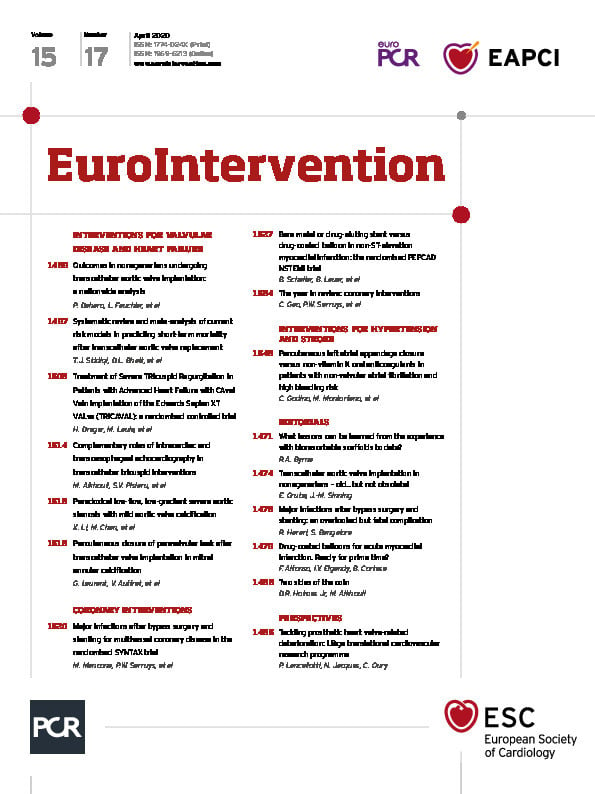
Randomised clinical trials help to study the science of what can be done and what can be accomplished. While these studies suffer from “entry” bias which dictates that there must be validated equipoise between the two approaches to be studied, they form the basis of the most highly controlled and highest levels of evidence in studying specific patient scenarios1,2. In contrast to randomised clinical trials, registries tell us what we are actually doing and have greater relevance to clinical practice at large. Both sides of the coin give very valuable, albeit different, data3,4.
The current single-centre registry study of Cosmo Godino et al3 provides information on real-world clinical practice in patients receiving a left atrial appendage occlusion (LAAO) device for stroke prevention in the setting of non-valvular atrial fibrillation (NVAF).
It involves a consecutive series of 940 patients with NVAF presenting to a single institution for evaluation of stroke prevention in the setting of NVAF. It is a complicated analysis; however, the specific question to be addressed involved 382 of the patients who had presented with an elevated HAS-BLED score – a score which, while imperfect, is widely used in selecting patients who would be at risk for haemorrhage if anticoagulation was administered. The analysis of this registry included an unmatched group of 193 patients treated by their clinical physician with an LAAO and 189 treated with one of several direct anticoagulants (DOACs). Because of differences in baseline clinical characteristics, the authors used propensity matching to identify a smaller subgroup of patients, 96 of whom were treated with an LAAO device and 96 with a DOAC. Importantly, this propensity score matching adjusted for the multiple variables included in both the CHA2DS2-VASc and HAS-BLED scores.
After this adjustment, there was no significant difference in age between the LAAO and the DOAC groups (73.8 versus 75.3 years, p=0.15), CHA2DS2-VASc score 4.3 for both groups, chronic kidney disease (46.8% vs 35.4%, p=0.13), or prior ischaemic stroke (35.2% vs 29.2%, p=0.35). There were, however, important differences: patients in the LAAO group had a higher incidence of prior intracerebral haemorrhage (26% vs 1.0%, p<0.001), as well as more prior bleeding events (65.6% vs 49.0%, p=0.02). Subgroup analyses of the specific LAAO device used were limited as three different devices – WATCHMAN™ (Boston Scientific, Marlborough, MA, USA), AMPLATZER™ Cardiac Plug and AMPLATZER™ Amulet™ (both St. Jude Medical [now Abbott Vascular], St. Paul, MN, USA) – were used in this clinical experience. In addition, analysis of the particular effect of a specific DOAC was also limited because patients were treated with either dabigatran, apixaban, or rivaroxaban. Such small numbers in these subsets ruled out valid statistical analysis.
In the total experience, the median/interquartile range follow-up was 2.4/2.1-2.9 years. There were differences in the outcome between the unmatched groups of patients – LAAO versus novel oral anticoagulants (NOACs). These included an increase in all-cause death in the LAAO group (18.7% vs 10.6%, p=0.049), but there was no difference in cardiac death alone. However, there was an increase in overall bleeding in patients on DOACs (8.5% vs 5.2%, p=0.023). These differences were, in part, attributed by the authors to differences in baseline characteristics. These issues were addressed by the propensity score matching approach which identified 96 patients in each group who had very similar characteristics. In this smaller group of patients, there was no difference in all-cause death (NOAC 10.4% vs LAAO 15.6%, p=0.28), rate of thromboembolism (7.3% vs 6.3%, p=0.77) or in the International Society on Thrombosis and Haemostasis major bleeding rate (6.3% vs 6.3%). With multivariate analysis, significant independent predictors of all-cause mortality included dialysis (hazard ratio [HR] 5.65, 95% confidence interval [CI]: 2.20-14.8, p<0.001), and age (HR 1.08, 95% CI: 1.05-1.13, p<0.001). However, the C-statistic value was rather limited at 0.72.
Several lessons can be learned from this important single-centre registry analysis.
1. This current registry documents no differences in thromboembolic events or in major bleeding between groups of patients with similar baseline clinical characteristics who are at higher bleeding risk and who are then treated with either DOACs or LAAO. Hence, it suggests that, in patients with NVAF at increased risk for stroke in the clinical setting who are at high risk for bleeding, both LAAO and DOACs may be used.
2. There are risks and benefits to each approach which need to be considered and fully discussed with the patients before final recommendations are implemented.
3. Two planned randomised clinical trials (CATALYST and CHAMPION) will provide a wealth of direct comparative data between DOAC and LAAO. However, these trials are set to enrol DOAC eligible patients (i.e., those who are deemed suitable for long-term anticoagulation). Hence, questions will remain about the best management of patients who are at high risk of bleeding (DOAC vs LAAO)4. In the absence of specific randomised controlled clinical trials to address these cohorts of patients, experienced clinical judgement is essential for providing optimal strategies of care.
The current study provides reassurance that both LAAO and DOAC are viable stroke prevention options in NVAF patients who are at risk of both stroke and bleeding. It does, however, emphasise the need for judicious use of both modalities, careful patient selection, and proper shared decision making.
Conflict of interest statement
The authors have no conflicts of interest to declare.
Supplementary data
To read the full content of this article, please download the PDF.

